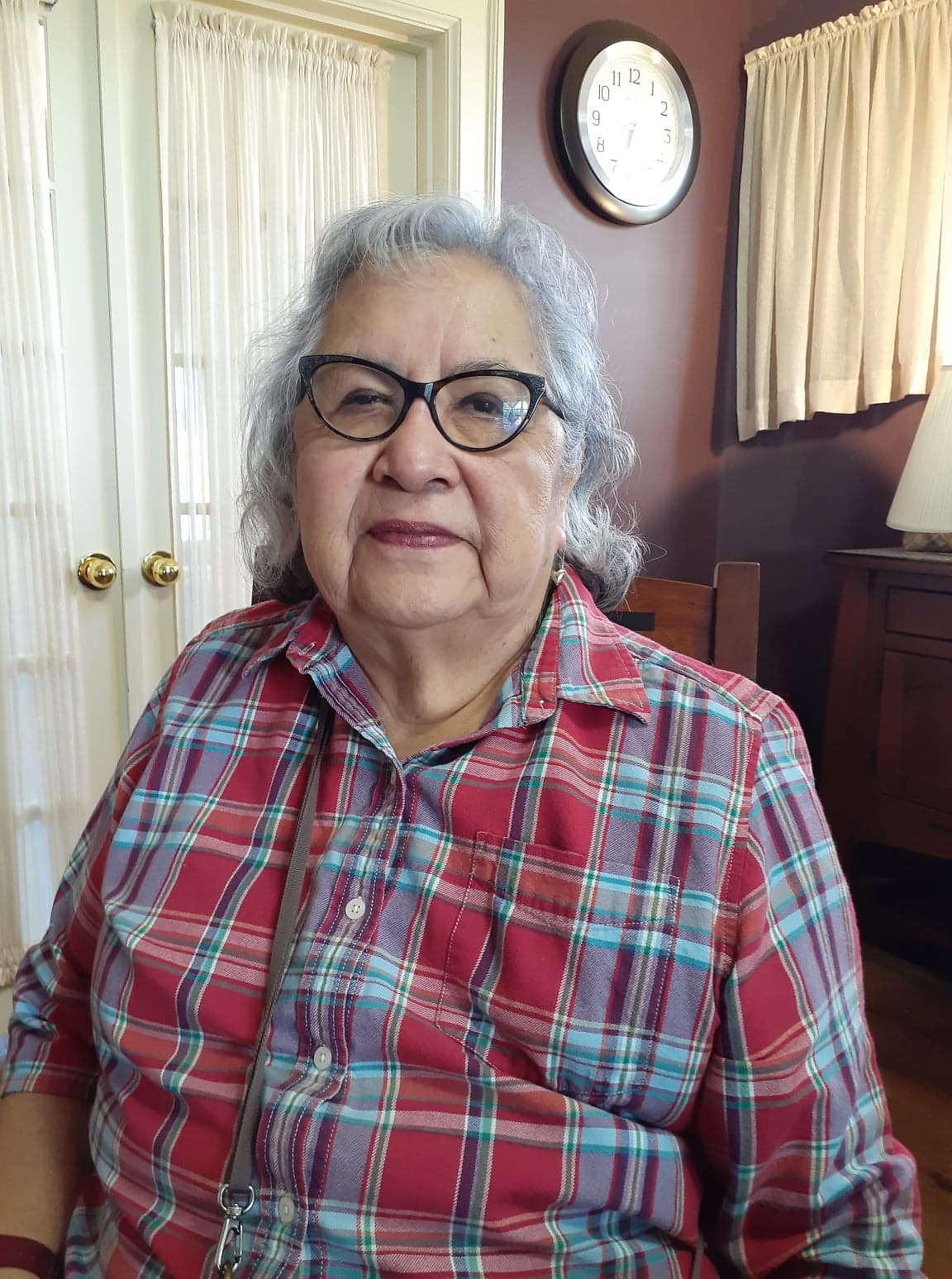Eileen Black- The Teachers Were so Cruel
Ok my name, my English name is Eileen Black. My Siksika name is Isitsimani, it was given to me when I was young, and I grew up with this name. I was never given a different name. I grew up and was raised when I was young by my father and mother a who were members of the Horn Society, the Horns. The way of life they lived we were taught to be kind and respect people and to listen. Now I am sitting here in, I forget how to say Old Sun in Blackfoot. Interviewer said Natosapiois (Old Sun School) So that makes sense Natosapiois the Old Sun School.
I was still young, I think maybe I was 6 years old when I started, when I was brought here to start school. Ah, then I was still very young… I couldn’t understand I couldn’t understand why I was not at home anymore with my mother. I was brought here [Old Sun], I had never been in a house this huge. We came here for church in the chapel on Sundays and then we were brought here to start school. There’s so much I don’t remember, I can’t remember. I don’t know if it’s because when I finished, that’s not quite the word I want to say but when I finished here, I’m thinking of what happened to me at the residential school.
There were many things that I saw in the classrooms especially. Ah my classmates, the way they were treated bad not only by the teachers but by the others who stayed at the residential school. I couldn’t understand, I could never understand, I used to think we were all from the same tribe. Yet they were so bad and mean by hitting, pinching, and because of them I was treated bad by them. When we see them in church with their parents, they would act so innocent about the bad way they acted.
The teachers were so cruel, so mean, and so bad. It seems like they thought at the snap of a finger we would just understand English. I was raised with the Blackfoot language and we hardly ever spoke English at home. English, we hardly spoke English ‘till the teachers. If we did not pronounce properly this language, they wouldn’t speak to us in a gentle way instead they would just shout. Shout at and yell at you. They had those, I hated those big wooden rulers [laughs], they used to slap our hands and tell you, “don’t say that! You say it this way.” Some would bluntly say, now a days we know that’s not acceptable, they tell us, “you are stupid. You are stupid, you don’t know anything, and you are not going to ever learn anything. You are so stupid in English.”
So how could we… how could we [clears throat]… how could we understand what we are being taught when they speak to us in this manner? Because all the time we were scared, Myself, I was scared all of the time. I was scared I might say the wrong thing and then get slapped on my hand and get… especially that, her name was… I did not know her well but I was in class with her. Her name was… I would see I was around her enough to know when she used to pinch us, specially our ears… Mrs. King or Miss King. And I used to think how that I understand about residential school, they were so cruel. And had a big nose. I wish I knew how to talk back to her and tell her that.
I think of how in the past I was a mean person, and I know where this behavior comes from. Where it comes from, being a mean person, is because of the bad experience I had at residential school. I used to think if I had ever met that Miss King, I think, I think would have slapped her face at that time. I think I would have hit her and I would not tell why or who I am. I would just slap her hard and tell her “how does that feel?” But along the years I learned, ah, I learned ah… to forgive. It was really hard for people like that, to pray for them. Because I was taught when I was young to pray for and to forgive. That is our way of life and how we were taught. They stressed for us to follow those ways and teachings, in our cultural way of life. And so that is one the things I had to work on for that Miss King, and she was not the only one, forgiveness.
So, I have learned to forgive. I have learned to forgive but I can’t say I forgotten, ‘cause we are never going to forget this, ever. If you have gone through the residential school experience, it is something that you will always remember but you have to work on, on that forgiveness. You have to forgive yourself because a lot of times us, we blame ourselves. Me, I blamed myself instead of the other way around. I blamed myself ‘till I understood. So now I can… I let that anger go. I let that hate go. And her… that’s her dealings with the Creator. Now I have to look after myself me and I was able to continue and able to continue try hard.
– Isitsimani, Eileen Black
Notes:
Oral interview with Eileen Black. Conducted, translated, and transcribed by Angeline Ayoungman. Old Sun Community College, June 29, 2022.

